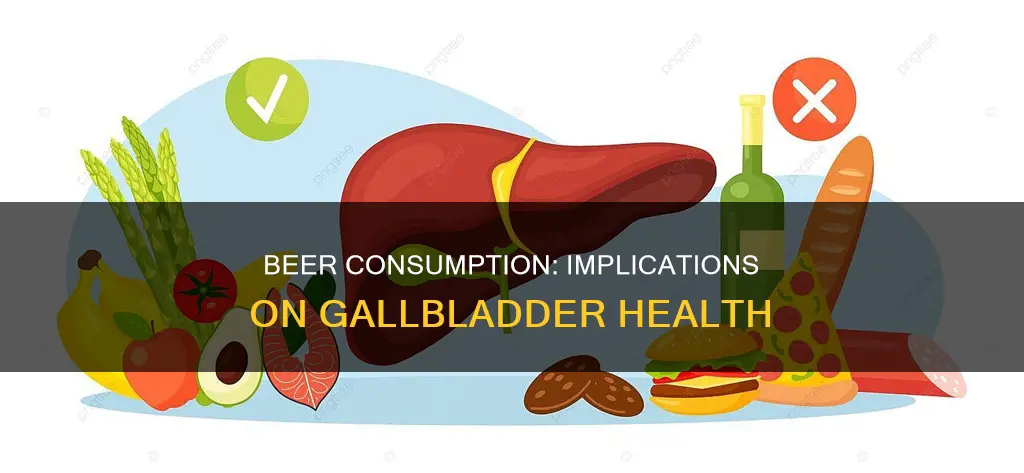
The gallbladder is a small, pear-shaped organ located under the liver, which stores and releases bile to help with fat digestion. While moderate alcohol consumption may reduce the risk of gallstones, heavy drinking negatively impacts gallbladder health and increases the risk of gallbladder cancer. Beer, in moderate amounts, may help prevent gallstones, but excessive consumption can lead to health issues. So, while beer may have a protective effect on the gallbladder in small quantities, overconsumption can have detrimental consequences.
| Characteristics | Values |
|---|---|
| Can beer affect the gallbladder? | Yes, beer can affect the gallbladder. Research suggests that moderate alcohol consumption may reduce the risk of gallstones, but heavy drinking can negatively impact gallbladder health and increase the risk of gallbladder cancer. |
| How does beer affect the gallbladder? | Beer can affect the gallbladder by impacting its ability to empty properly. Some studies suggest that alcohol may slow down gallbladder emptying, while others suggest it has no significant effect. |
| How much beer is considered moderate consumption? | Moderate alcohol consumption is typically defined as no more than 1 drink per day for women and no more than 2 drinks per day for men. One drink is equivalent to 12 ounces of beer (5% alcohol content). |
| What are the risks of heavy beer consumption? | Heavy beer consumption can have various negative effects on the body, including an increased risk of gallbladder cancer, liver problems such as cirrhosis, and other health conditions. |
What You'll Learn
- Moderate alcohol consumption may reduce the risk of gallstones
- Heavy drinking may increase the risk of gallbladder cancer
- Alcohol may cause gut inflammation, which can spread throughout the body
- Alcohol does not cause gallstones but can negatively impact gallbladder health
- Alcohol affects bile production in two ways

Moderate alcohol consumption may reduce the risk of gallstones
The gallbladder is a small, pear-shaped organ located under the liver. It is part of the biliary system, which also includes the liver and pancreas. The gallbladder's function is to store bile, which is essential for fat digestion.
Gallstones are a common gallbladder condition, affecting 10-15% of people in the United States. They are formed when there is a buildup of bilirubin or cholesterol in the bile, resulting in hard lumps that can block the bile ducts.
While heavy alcohol consumption is known to have negative effects on the body and can increase the risk of gallstones, limited research suggests that moderate alcohol consumption may lower the risk. According to a 2019 review of 24 studies, moderate drinking was associated with a decreased risk of gallstones. However, it is important to note that the mechanism behind this reduced risk is not yet fully understood.
Moderate alcohol consumption typically refers to:
- One drink per day for women
- Two drinks per day for men
Where one drink is equivalent to:
- 12 ounces of beer (5% alcohol content)
- 8 ounces of malt liquor (7% alcohol content)
- 5 ounces of wine (12% alcohol content)
- 1.5 ounces of liquor (40% alcohol content)
It is important to note that excessive alcohol consumption can outweigh the potential benefits and lead to serious negative health effects. Additionally, healthcare professionals generally recommend consuming little to no alcohol. Therefore, it is crucial to drink in moderation and prioritize overall health and well-being.
Beer and Cutting: Friends or Foes?
You may want to see also

Heavy drinking may increase the risk of gallbladder cancer
Heavy drinking can have detrimental effects on the body and is associated with a number of health conditions. Research has shown that it may also increase the risk of gallbladder cancer.
The gallbladder is a small, pear-shaped organ located under the liver, which stores bile to aid digestion. While moderate alcohol consumption may lower the risk of gallstones, heavy drinking can negatively impact the gallbladder and increase the risk of gallbladder cancer.
Heavy drinking is defined as more than 4 drinks a day or 14 drinks per week for men, and more than 3 drinks a day or 7 drinks per week for women. It can lead to alcohol use disorder (AUD), a condition where a person continues to consume alcohol despite the adverse health consequences. According to the World Health Organization (WHO), approximately 3 million deaths worldwide are attributed to the harmful use of alcohol each year.
Alcohol is a toxin that the liver must flush out. However, heavy drinking can overwhelm the liver, leading to cell death and cirrhosis, a condition where scar tissue replaces healthy liver cells. This can slow down gallbladder emptying, increasing the risk of gallstones. Additionally, heavy drinking is associated with an increased risk of various cancers, including liver cancer.
Furthermore, heavy drinking can cause digestive problems, such as inflammation and interference with gastric acid secretion, resulting in heartburn, acid reflux, and swelling. It can also affect the pancreas, leading to pancreatitis, a dangerous inflammation that can impact insulin production and increase the risk of diabetes.
Excessive alcohol consumption is also linked to mental health issues, including depression, anxiety, and alcohol psychosis, which can mimic schizophrenia. It can affect the brain's communication pathways, making it harder to think, speak, remember, make decisions, and coordinate movements.
To reduce the risk of harm from alcohol, it is recommended that healthy adults consume no more than 10 standard drinks per week and no more than 4 standard drinks in a day. If you or someone you know is struggling with alcohol dependence, it is important to seek professional help or contact support groups.
Beer and Weight Loss: Is It Possible to Have Both?
You may want to see also

Alcohol may cause gut inflammation, which can spread throughout the body
The gastrointestinal (GI) tract is at particular risk of damage from toxins. Poor gastrointestinal health can have a significant impact on overall health. Therefore, anything that may cause GI damage may have far-reaching consequences beyond the intestines.
Research suggests that alcohol, especially when consumed chronically and in large amounts, induces a process that begins in the gut and promotes inflammation throughout the body. This alcohol-induced intestinal inflammation may be the root cause of multiple organ dysfunctions and chronic disorders associated with alcohol consumption, including chronic liver disease, neurological disease, GI cancers, and inflammatory bowel syndrome.
The gut microbiome is our body's non-human inhabitants, such as bacteria, viruses, and fungi. A healthy gut microbiome has a balance of bacteria that support our bodies by:
- Supporting our immune system
- Supporting our metabolism
- Regulating inflammation
- Working with the liver to defend against toxins
- Helping to prevent chronic and infectious diseases
When we drink alcohol, it impacts the oral microbiome and the digestive system and involves other organs along the way. Alcohol can change the balance of bacteria in the gut microbiome, causing it to shift from a state of homeostasis to a state of dysbiosis.
The gut microbiome works to metabolize the different components of alcoholic drinks, creating products called metabolites. Some of these metabolites are toxic and can harm the microbiome. There is a protective mucus layer on the intestinal lining of our gut. When the gut microbiome gets out of balance, it begins to eat away at the protective layers between the gut, the rest of the body, and the circulating blood, causing a change in gut integrity or a "leaky gut".
Excessive alcohol consumption leads to a leaky gut, decreased gut absorption, and increased production of bile in the liver, all of which can lead to diarrhea. Alcohol also disrupts the production of mucus that lines the stomach, causing the stomach lining to become inflamed, a condition called gastritis.
Additionally, alcohol consumption disrupts the digestion of sugars and the balance of bacteria in the gut. It also leads to a shift in the gut's normal fungal diversity, causing overgrowth of a type of yeast called candida. These shifts increase gas production in the gut, resulting in abdominal bloating.
Heavy alcohol use can also damage the pancreas. The pancreas metabolizes alcohol into toxic byproducts that damage the pancreatic ducts. Enzymes that would normally be released into the digestive tract build up inside the pancreas and can begin to digest the pancreas itself, causing a very painful inflammation called pancreatitis.
While moderate alcohol consumption may have some health benefits, such as a reduced risk of gallstones, the negative effects of drinking too much alcohol outweigh the benefits. Excessive alcohol consumption is associated with an increased risk of various health conditions, including:
- Injury due to car accidents or falls
- Increased chance of violent and harmful sexual behaviors
- Miscarriage, stillbirth, or fetal alcohol spectrum disorders if drinking during pregnancy
- Weakened immune system, increasing the chances of becoming ill
- Learning and memory issues
- Relationship and job-related issues
- Various cancers, including breast, throat, esophagus, liver, colon, and rectal cancer
- Mental health conditions such as anxiety and depression
Beer and Chardonnay: A Match Made in Heaven?
You may want to see also

Alcohol does not cause gallstones but can negatively impact gallbladder health
The gallbladder is a small, pear-shaped organ located under the liver. It is part of the biliary system, which includes the liver and pancreas, and is responsible for producing, storing, and releasing bile—a substance that helps with fat digestion. Typically, the gallbladder only becomes a topic of concern when problems arise, such as the formation of gallstones, which are common and affect 10-15% of people in the United States.
While alcohol consumption is not a direct cause of gallstones, heavy drinking can indirectly contribute to their development through liver cirrhosis, a serious condition linked to drinking that can lead to gallstones due to complications from liver scarring. Research suggests that moderate alcohol consumption may reduce the risk of gallstones, but it is important to note that the negative effects of drinking too much alcohol outweigh any potential benefits.
Heavy alcohol consumption is associated with an increased risk of various health issues, including liver problems, cancer of the gallbladder, and acute pancreatitis, which can be exacerbated by the presence of gallstones. Additionally, excessive drinking can lead to malnutrition, poor dietary intake, and digestive disorders.
Although the exact mechanism is unknown, one theory suggests that alcohol may reduce the risk of gallstones by increasing the rate at which the gallbladder empties, thereby lowering the amount of bile available for stone formation. However, some studies contradict this theory, finding no difference in gallbladder emptying between drinkers and non-drinkers or even indicating that alcohol slows down gallbladder emptying.
It is worth noting that alcohol affects bile production in two ways. Firstly, alcohol temporarily suppresses bile synthesis whenever it is consumed. Secondly, chronic heavy drinking can lead to long-term liver damage, further impairing the liver's ability to produce bile.
While moderate alcohol consumption may have a protective effect against gallstones, it is important to remember that excessive alcohol use can result in various chronic illnesses. Healthcare professionals generally recommend consuming little to no alcohol to minimize the risk of alcohol-related health conditions.
Beer and Lamisil: Is It Safe to Mix?
You may want to see also

Alcohol affects bile production in two ways
Firstly, alcohol is believed to increase the uptake of bile acids. In moderate amounts, this can reduce the risk of developing gallstones. However, heavy drinking can have adverse effects on bile production, as well as the functioning of the liver and other vital organs.
Secondly, alcohol affects bile production by slowing down gallbladder emptying. This is contrary to the theory that alcohol increases the rate at which the gallbladder empties, which would reduce the amount of bile that lingers in the gallbladder, thereby lowering the risk of gallstone formation.
Drinking Beer with Nocor: Is It Safe?
You may want to see also
Frequently asked questions
Drinking beer may not directly cause gallbladder issues, but excessive alcohol consumption can negatively impact your health in several ways and increase the risk of gallbladder cancer.
Research suggests that moderate alcohol consumption may reduce the risk of gallstones. However, the protective effect of alcohol is not well understood, and heavy drinking can lead to other health issues.
Alcohol affects bile production in two ways: it temporarily suppresses bile synthesis, and chronic heavy drinking can lead to long-term liver damage, impacting the liver's ability to produce bile.
According to the Centers for Disease Control and Prevention (CDC), moderate alcohol consumption is defined as one drink per day for women and two drinks per day for men.







